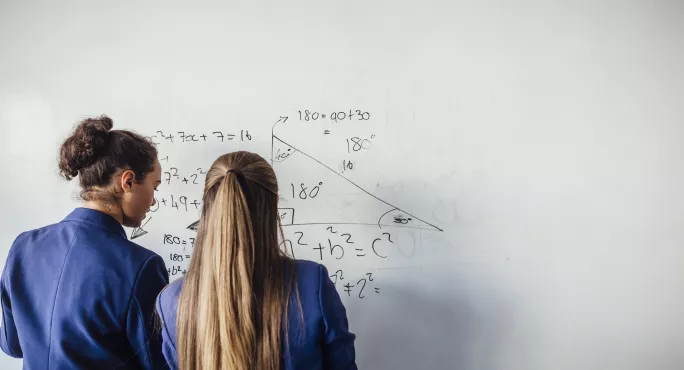- Home
- England climbs Pisa table as reading and maths improve
England climbs Pisa table as reading and maths improve

A significant improvement for England in maths and a small rise for reading helped the country to move up the Pisa rankings, according to the latest edition of the study released today.
But there was a decline in science, shared by some of the highest-performing countries in the Programme for International Student Assessment (Pisa), which compares the results from 600,000 15-year-olds taking tests across 79 countries.
East Asia again dominated the top positions - for the fourth consecutive Pisa, which the Organisation for Economic Cooperation and Development (OECD) carries out every three years.
A joint entry from the four Chinese provinces of Beijing, Shanghai, Jiangsu and Zhejiang topped all three subjects (maths, reading and science). Estonia was the highest performing country in Europe.
England’s results are likely to be claimed by some as a vindication for the sweeping reforms introduced by former Conservative education secretary Michael Gove; although teaching unions have quickly tried to discredit the suggestion.
News: Pisa responds to critics with new computer tests
Analysis: Pisa data ‘incredibly underused’, says academic
Read: ‘Strictest school’ gets top marks from Pisa chief
The students who sat the Pisa tests last year had spent four years studying the controversial national curriculum introduced to schools in 2014 and were working towards Mr Gove’s intentionally tougher GCSEs.
Pisa: England moves up tables
In maths, England achieved an average score of 504, up 11 points from the previous Pisa cycle in 2015. That leaves England ranked 17th, just one place behind Finland and up from 26th in 2015; but behind countries including Estonia, Poland and the seven top-ranked East Asian systems.
Reading also improved for England, but just by a statistically insignificant five points to 505, which puts the country in a joint 13th position - higher than the 17th position it held in 2015. This leaves England level with the US, but below countries including Ireland, Canada and Poland.
But the science performance continues to drop - England achieved a score of 516 in 2012, 512 in 2015 and in 2018 the figure fell to 507. Its comparative rank in the subject, however, has gone up one place to joint 13th.
This may be due to the fact that other high-performing countries have also slipped down in their science scores: for example, Singapore, which lost five points to 551, Japan, down nine points to 529, and Finland, down nine points to 531.
England also achieved slightly higher scores than the UK as a whole - the UK’s average scores were 504 on reading, 502 in maths and 505 in science - and was the highest-performing out of the four nations.
However, England’s progress is reflected in the UK’s performance, according to the OECD official who runs Pisa, Andreas Schleicher, who pointed to the positive trends in maths and reading.
“I think we can talk about signals of progress,” he said. “I am not just talking about the outcome here, but also about the student perception of the learning environment, disciplinary climate, teacher support.”
But he added: “You could say that you would want to compare the UK with the most advanced education systems, not the OECD average, so there’s every reason for the UK to look forward towards improving its overall performance.”
Angela Donkin, chief social scientist at the National Foundation for Educational Research, which delivered the Pisa tests in England, said the results were less positive than they could have been, given recent reforms to England’s education system.
“Scores in reading and science have not improved as significantly as you would expect given the focus on improving standards in these subjects,” she said.
“There has been significant investment in Stem and reading - across this cohort’s lifetime, there has been literacy teaching hubs, a stronger focus on phonics, but we have not seen a significant change.
“There’s also been a drive to improve Stem and we are not seeing the same level of difference as we are in maths.”
Kevin Courtney, joint general secretary of the NEU teaching union, said: “The findings from Pisa 2018 of the performance of 15-year-olds in English, maths and science reflect an education system before the market reforms introduced by former education secretary Michael Gove and pursued by subsequent secretaries of state.
“We will have to wait for the next round of Pisa tests taken in 2021, with the results published the following year, before a verdict can be given on the Conservatives’ management of the English education system.”
Geoff Barton, general secretary of the Association of School and College Leaders, said: “We are delighted that the UK’s performance in maths has improved by nine points since 2015, and that the scores in reading, maths and science are all above the OECD averages.
“As these results come during a general election campaign, there will be a greater temptation than normal among politicians and commentators to attempt to use them to score points.
“However, we would caution people against over-claiming or over-blaming any one factor on the difference in results between countries and over time.
“There are many educational and non-educational factors which affect performance and it is not easy to unpick how these have impacted on young people’s attainment in a set of tests.”
Mr Schleicher added that when countries take notice of their outcomes and look at what the higher-performing countries are doing then Pisa can effect changes in the education system. In that context, he mentioned the UK’s “efforts to learn from East Asia” in mathematics education as a possible factor.
Keep reading for just £1 per month
You've reached your limit of free articles this month. Subscribe for £1 per month for three months and get:
- Unlimited access to all Tes magazine content
- Exclusive subscriber-only stories
- Award-winning email newsletters



